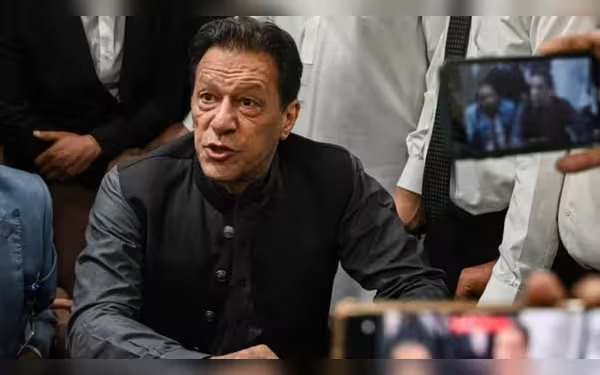Thursday, December 5, 2024 02:37 AM
Imran Khan Faces Arrest in New Cases Linked to PTI Protests
- Imran Khan faces arrest in seven new protest-related cases.
- Violent protests led to tragic loss of lives and arrests.
- Anti-terrorism court issues warrants for Khan and associates.
 Image Credits: thenews
Image Credits: thenewsImran Khan faces arrest in seven new cases linked to PTI protests, highlighting the ongoing political crisis in Pakistan.
In recent developments, Imran Khan, the founder of the Pakistan Tehreek-e-Insaf (PTI) party, has found himself in a precarious situation as he faces arrest in seven new cases linked to protests organized by his party. This comes on the heels of his previous legal troubles, which have seen him incarcerated and presented before an anti-terrorism court judge at Adiala jail. The latest round of legal challenges stems from PTI's protests in the federal capital, which have been marked by significant unrest and violence.
Imran Khan was brought before the court after completing a six-day physical remand related to a separate case concerning a protest that took place on September 28 in Rawalpindi. The prosecution did not request an extension of his physical remand, indicating a shift in strategy. The new cases, filed at various police stations, accuse Khan of inciting demonstrations that led to violent confrontations, particularly during protests on October 5 and November 24. The situation escalated dramatically during the November protests, resulting in the tragic loss of lives, including at least three Rangers personnel and two police officers, as well as claims from PTI that around 20 of its members were killed.
During the court proceedings, the police arrested Khan in connection with these new cases, but the prosecution opted not to seek his physical custody. Consequently, ATC Judge Amjad Ali Shah placed Khan on judicial remand for all cases, including the fresh allegations. This decision reflects the ongoing tension between law enforcement and PTI supporters, as the protests have often turned violent, leading to significant clashes with security forces.
The crackdown on PTI protests has been severe, with authorities launching late-night operations to detain party workers and leaders. Reports indicate that over 1,000 PTI workers were arrested, including more than three dozen Afghan nationals, alongside the recovery of tear gas and other crowd control ammunition. The situation has raised concerns about the treatment of political dissent in Pakistan, as the government seeks to maintain order amid rising tensions.
In a related development, an anti-terrorism court in Islamabad issued arrest warrants for Imran Khan, his wife, and 94 others, in connection with riots and clashes that occurred near D-Chowk in Islamabad. The warrants were issued at the request of the police, highlighting the serious nature of the allegations against the former prime minister and his associates. The ongoing legal battles and the violent backdrop of PTI protests underscore the deepening political crisis in Pakistan.
As the situation unfolds, it is crucial for citizens to remain informed about the implications of these events on Pakistan's political landscape. The legal challenges faced by Imran Khan and the PTI not only reflect the current state of political affairs but also raise questions about the future of democratic processes in the country. The ongoing protests and the government's response will likely shape the narrative of political dissent in Pakistan for years to come.













